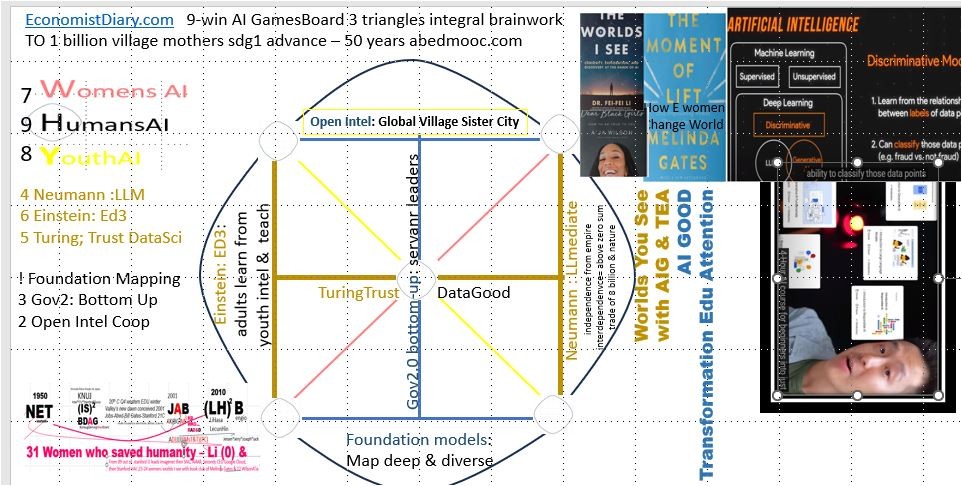Mapping of our global earth has gone through 4 trading revolutions
Empire rulers began remapping world in late 1400s- overall, this was pretty ruthless with genocide of native peoples and slave trading and economic benefits to the empire not the colonies the empire ruled over
Empire + engineering type 1 began in scotland 1760s - type 1 engines manufactured things, built railway transportation, started investing more in cities (also sadly in britains case gave china the impossible choice - accept opium as a currency or close off for world trade. This historically most advanced peoples chose to close themselves for 110 years - a responsibility i feel all Brits (and ENGLISH LANGUAGE INTEL MODELLERS) must be aware of). footnote 1
empire + engine type 2
From 1865 switzerland was charged with stewarding 2 standards - connecting people with telecoms and with electricity grids; unfortunately although these served to integrate human relationships this 2nd type of engine also saw generation of2world wars
During world war 2, 1943 witnessed the hundredth anniversary of The Economist as weekly newsheet of royal societies in london encouraged by queen victoria to transform mapping from (slave trading) empire to commonwealth. editor geoffrey crowther concluded that economic journalists had failed to question ahead of engineering system transformation,
EMPIRE & ENGINEERING TYPE 3
Journalists were trained to value engineers purposes; by 1951 it was clear from Neumann Einstein Turing that a new type of engineering - of intelligence - would accelerate http;;//neumann.ning.com
The specific vision of designing machines to multiply brain power is clearly published in neumann last nores computer and the brain written 1956. Unfortunately he was taken from us in his 50s and turing his 30s so there are different views of exactly when mapping engineering intelligence took over as core game of every human livelihood
2025 Today it is evident that intelligence machines offer more than billion times mathematical capability of individual human brains.
\case eg alphafold3 (open source 250 million proteins by hassabis deepmind loncon-cambridge0doing a billion years of man work in under a year . Hopefully every public media will help massively debate innovations such processing of deep data maps can offer (eg all cancer data, climate data , ... ) in 2025 we wish to celebrate nvidia partnership with the 101 public broadcasting channels of European Union as one benchmark case
How else can we make sure that every family joins in celebrating now that the era of intelligence engineering is open and in full flow?
Footnote (in 970s as china came out - it has been fascinating to map relationships of singapore, hk, taiwan, korea and japan). When we look at intelligence age first million fold advance- this is due to chips engineers 1965-1995 connecting valley on west coast usa with far east asian clients who manufactured most microelectronic advances. Chip design was first of three million fold leaps in tech. Nvidia's partners founded 1933 brough million times deeper analysis with GPUs. This combined with million times more data transmission throufh eg satellites (eg 1G to 6G) brings inteligence engineering to every human skill and data mapping.
some interesting latest partnerships
nvidia and eu's 100+ public mass media https://www.broadcastnow.co.uk/tech-innovation/ebu-partners-with-nvidia-to-build-sovereign-ai-and-cloud-tech/5206007.article
catalogued by 17 sdgs http://povertymuseums.blogspot.com/2001 to http://povertymuseums.bl;ogspot.com/2017
parts of soft launch ai guide of nations 1 2
IMAGINE AIntelligence Engineering like map of Airports
Nvidia eg jensen huang has spread deep learning ai from valley and taiwan to everywhere
deepmind eg hassabis has spread pattern maths of natures ai including biotech from l,ondon-cmabridge to valley across europe and everywhere biotech is advanced
yann lecun has helped academics localise language models and translations from Valley & Paris through New YOrk and Fair chapters to India and now eg wherever Europe replicates europe ai week summer 2025
musk ai travels through lo0w latency space and experimets at edge of world biggest supercomputer probably leading humanoid research
which leaders of ai diat sovereignty can you digitally twin with this emerging ai map of intelligence generation
west coast usa and pacific advanced engineering of millenials relevant intelligence ai from 2001 while east coast and atlantic ai seems to have got lost apart from deepmind pattern maths ai (advancing einsteins 1905 challenges e=mcsquared)
Between 2001 and 2003 steve jobs helped advance both womens community ai and health ai
he hosted valley's 65th birthday partner with fazle abed engineer of women empowering nation of bangladesh (brac partners from 1972); jobs demanded to understand how abeds transformation of community intel SHEL*FF could be shared worldwide
Abed committed to forming a university where female graduate research could progress worldwide partnerships - eg by early 2010s brac partners had designed largest cashless banking system in terms of customers - it leveraged how ai texts could replace paper money reducing costs of banking operations especially for remittances either of money from city to villages or from abroad (one third of bangladesh foreign exchange) earned by bangladesh diaspora remittances
(sdg 1 = land & finance) 2 =food 2 =health 4=education-livelihoods 5 =she-safety governed bommunities
SHE*FF can further gravitate WE - goal 6 access to water, 7 e- access to renewable energy
8 Youth (ie millennial lives and livelihoods)
meanwhile steve Jobs did at least 3 things
he started coding pixels with nvidia jensen huang- this was first time binary programming was replaced- it soon became pivotal to radiology ai then all pattern maths ai
Jobs gavc commencement talks at stanford- dont get trapped only in 4 year paper degrees-
jobs started designing a university in a mobile - sadly his health started to fail before he could see the full impacts of nvidia partners of ai from 2009; hassabis deepened ai health biotech models; fei-fei li ai perception identification models became perception*chats*reasoning*physical - elements needed before autonomous ai delivers humanoids or agentic ai
==============also


































